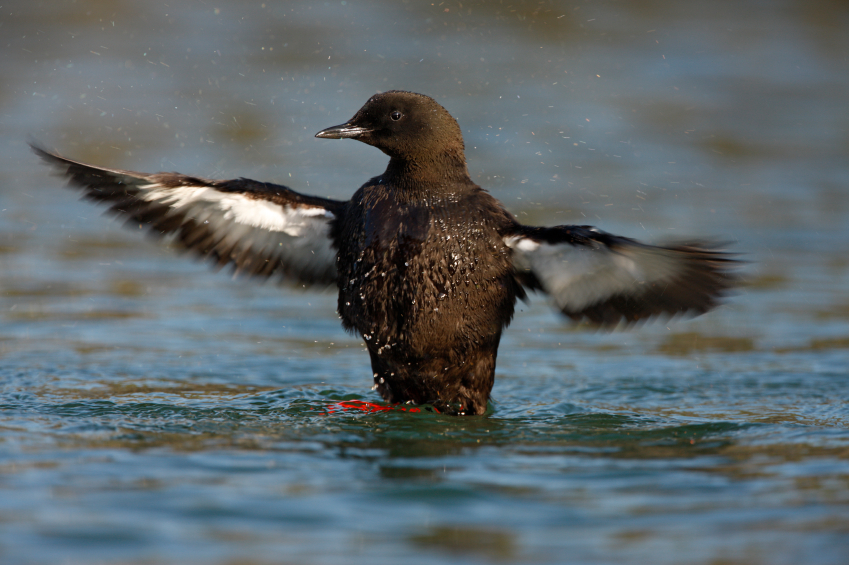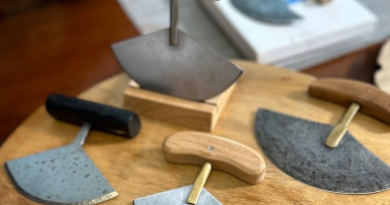Ice-Blog: From Alaska to Ottawa
Ottawa has been the setting for “Arctic Change”, another major Arctic conference this week. It is organised by the research network ArcticNet.
I was not able to attend, but have been interviewing various people for an article on DW about the meeting, and about what is happening in the Arctic at the moment. One of the people I spoke to was George Divoky, who went to the meeting to put his own work into context and get the “big picture” of how climate change is having an impact on the Arctic. George is the mainstay of Friends of Cooper Island.
He has a bird research station on Cooper Island, off Barrow, Alaska. For 45 years, he has been there every summer, observing a colony of black guillemots, who breed there. As he told me when I first met him during a trip to Alaska in 2008, his ornithological observation widened out into an observation of climate change over the years, witnessing some dramatic changes. I would like to share his views with you here on the Ice Blog.
Iceblogger: Why are you attending the conference and what do you expect from it?
As someone who has spent the past 45 summers studying seabirds in the Alaskan Arctic, I am very interested in hearing the findings of arctic researchers working in other disciplines and geographic areas.
I expect to be brought up to date on the most recent findings of how warming and development is affecting the ecosystems and people of the Arctic. The information I obtain allows me to put my work (which is on a single species breeding on one island) in a much larger context.
Has the Canadian chairmanship of the Arctic Council affected Canada’s interest in the Arctic?
I know little of the international politics of the Arctic but my feeling is that Canada has always had a major interest in the Arctic because of the extent of their arctic lands and the large number of villages and settlements. With all that is now going on in the Arctic, Canada’s chairmanship certainly provides an opportunity for the country to focus on the region even more.
Are there differences in attitudes to the Arctic in the various countries involved? US; Canada, Russia, Norway…?
I feel that the US (with the exception of the indigenous people who live there) tends to treat its small part of the Arctic as a place to exploit natural resources and conduct research while Canadians have a much more organic (holistic) approach to the region. My impression is that is also true for Scandinavian countries.
What has been your experience of Arctic change on Cooper Island this year?
The 2014 breeding season on Cooper Island had the lowest number of breeding pairs of Black Guillemots in the last 20 years. Breeding success in 2014 was low as all of the younger siblings in then nests died from starvation during a major windstorm that occurred in August after ice retreat and parent birds could not find sufficient prey. We also had more polar bears on the island and interactions with them than during the last few years. Polar bears were rare visitors to the island until 2002.
What impacts of the above-average rise in temperature have you seen over your years on Cooper island?
Warming first aided the guillemots (1970s and 1980) as the summer snow-free period increased and was better suited for the 90 days it takes guillemots to breed. The size of the breeding colony increased during the initial stages of warming. Continued warming (1990s to present) caused the sea ice to rapidly retreat in July and August when guillemots are feeding nestlings and the loss of ice reduced the amount and quality of prey resulting in widespread starvation of nestlings. Reduced sea ice also forced polar bears to seek refuge on the island with large numbers of nestlings being eaten by bears.

How serious is the problem of thawing permafrost?
Thawing of permafrost has the potential to drastically change terrestrial ecosystems due to changes in drainage and plant communities. The large shorebird and waterfowl populations breeding on the tundra require large areas of ponds and lakes for breeding. Melting permafrost is allowing water to drain from the surface decreasing the extent of aquatic habitats while increasing the depth for root growth which facilitates shrubs replacing tundra plants.
Do you have a sense that there is a “rush for the Arctic’s resources” or is this just media hype?
It is clear to me that there is a rapidly increasing interest in arctic resources from government and industry.
Where should the priorities of Arctic research and Arctic policy be in coming years?
While there will certainly be increased research in the Arctic in coming years I think it is important to realize that just because humans know more about a region or ecosystem it does not necessarily follow that they will be any better at protecting it from impacts – or likely to do so. Pre-development ecological research is something most governments feel they must do to satisfy concerns about environmental degradation, but the ways in which that research can limit the effects of the post-development degradation – or assist in mitigating that degradation – is unclear. Similarly, researching climate change and its effects are important but of little practical use if the research does not inform government officials and result in policies that address the causes of climate change.
With the climate conference going on in Peru – do you have the feeling the world takes the changes in the Arctic seriously?
I feel that the entire issue of current and predicted climate change is now being taken more seriously and, as a result, there is more focus on what is occurring in the Arctic since people and government now see the changes in the Arctic as being less removed from their own experience.
Are you optimistic about the future of the Arctic?
I am not optimistic that what used to be considered the “Arctic” will persist into the future. The Arctic where I do research now bears little resemblance to the Arctic I first went to in 1970. With models showing summer sea ice may soon disappear and predictions for increasing temperatures and development, it is likely that current and future generations of researchers will also be taken aback with the pace of change during their time in the region. Clearly, the Arctic as a geographic region will persist but the characteristics that are evoked by the word “arctic” (i.e. snow and ice dominated landscapes far from human industrial development) will no longer apply to the region. And, of course, the biota adapted to the arctic ecosystems of the past will have very uncertain futures given the pace of change.
What will it look like in 20, 30, 50 years?
Much of the Arctic became technically subarctic during the last 20 years. At least for the near future, winters will always be cold in the Arctic so some seasonal snow and ice cover will be present but the annual period when snow and ice are present will decrease. The rate at which these changes will take place is unclear as an Arctic that is ice free in summer (and losing land ice in Greenland) might cause more rapid changes.
Can anything happen to save it?
I was very lucky to be able to be in the Arctic in the late 20th Century but it now seems clear that with the projected increases in atmospheric CO2 and resulting increases in temperatures and ocean acidifcation that the Arctic (as well as many of the earth’s natural areas) could be unrecognizable by the middle of the 21st Century.





